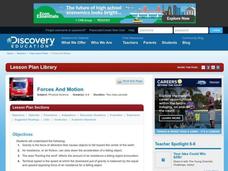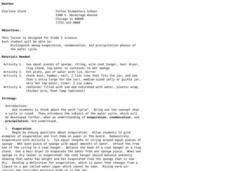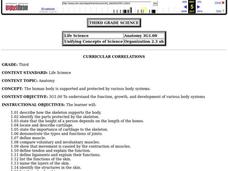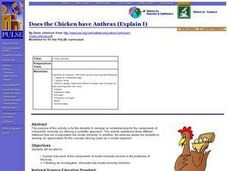Curated OER
Forces and Motion
Students build parachutes for chicken eggs. In this physics lesson, students describe the forces acting on a falling object. They predict which of the three parachute models they made has the best chance of keeping the egg intact after a...
Curated OER
Enzyme Lab
Students investigate the enzyme catalase. In this enzyme lesson plan, students observe a normal catalase reaction, they observe liver tissue, potato, chicken and apple for the enzyme catalase and they study the effects of temperature and...
Curated OER
What's Inside
Students become more familiar with life science in the context of the scientific method which helps them to become familiar with the various kinds of life science diagrams they may see on a GED science test.
Curated OER
The Egg Activity
High schoolers comprehend the three basic steps of science: 1) Observation, 2) Statements of cause and effect (Hypotheses), and 3) Testing. By working with an egg, students are required to observe an object that is very common to them. ...
Curated OER
Weather
Fifth graders study the water cycle. In this science lesson plan, 5th graders distinguish among evaporation, condensation, and precipitation phases of the water cycle.
Curated OER
Prehistoric Discoveries
Students agree or disagree with several statements about ancient animals, then read a news article about recent prehistoric discoveries. In this earth science and current events lesson, the teacher introduces the article with a...
Curated OER
Inside the Egg, Hatching Chickens
Students conduct an egg candling activity to show the life inside a fertile egg. Students discuss the needs the egg has of the hen, as well as similarities and differences between plants and animals. Students complete a life cycle wheel...
Curated OER
Observing Osmosis in a Chicken Egg
Tenth graders develop a hypothesis and explain what they observed on an activity. In this investigative lesson students observe osmosis and report their data using a graph.
Curated OER
Science: Birds in Flight
Young scholars identify and examine adaptations in birds that enable them to fly. They conduct Internet research to relate these adaptations to the physics of flight. Students observe birds in flight and describe their behavior and...
Curated OER
What is the Evidence for Evolution?
Learners identify one object that would tell the story of their lives. In groups, they determine what can and cannot be told from objects left behind. After watching a video, they compare and contrast chicken bones to human bones. To...
Curated OER
The Effects of "Recreational" Drugs on the Development of Chick Embryos as a Model for Human Embryogenesis
Students conduct experiments on fertilized chicken embryos to determine the possible developmental effects that various recreational drugs (caffeine, alcohol, nicotine, and aspirin) might have on them.
Curated OER
Skeletal System
Third graders describe and identify the parts of the skeleton and how they support the body. They observe two chicken bones that have been soaked in vinegar for 5 - 7 days. They observe the bone's appearance after it has been removed...
Curated OER
The Muscle System
In this biology worksheet, 9th graders define striated and identify if the muscles of chicken's leg are striated or smooth. Then they determine how the muscles of a chicken leg are attached to the bones. Students also cut muscles away...
Curated OER
Body Tissue
Human anatomy learners will grow more knowledgable about body tissue by viewing this presentation. Injected with a little humor (e.g. using a toilet paper roll graphic in place of the word "tissue"), it is sure to keep them engaged. The...
Curated OER
ACTIVITY 6: MAKE A FOSSIL MOLD AND CAST and ACTIVITY 7: HOW BIG WERE PREHISTORIC ANIMALS?
Instructions for two terrific ancient history lessons for your primary paleontologists are provided in this resource. The first involves the creation of fossil cast replicas using plaster of Paris. The directions are detailed, but the...
Curated OER
Agriculture: Oklahoma's Legacy
Sixth graders explore agriculture as it relates to crops over the course of a series of historical events. They read and create a timeline of the 50-year increments that depict important cause and effect events. Students then use...
Curated OER
Investigating Osmosis
A thorough investigation of cell transport is provided when completing the assignment. The first half requires biology class members to answer questions about diffusion and osmosis with the aid of diagrams. Then they fashion an...
Teach Engineering
What Makes Our Bones Strong?
So is that what you meant by rubber legs? The activity has pairs subject a chicken bone to vinegar and observe what happens over a period of days. Individuals then write up a lab report and document their observations and findings.
August House
The Ogre Bully
English language arts, math, science, dramatic arts, and cooking; this lesson plan has it all! In this multidisciplinary resource, your scholars will take part in a read aloud of The Ogre Bully by A.B. Hoffmire and have a grand...
Curated OER
Hatching Chicks to Agriculture - Where does the feed come from?
Second graders examine the types of grain that goes into feed for chickens. They study other grain crops grown in Kansas and the foods that are made from them.
Curated OER
Does the Chicken have Anthrax (Explain I)
Students explain how each of the components of innate immunity function in the protection of the body. Following an investigation, they articulate how innate immunity functions.
Curated OER
A Lucky Break
Students complete activities where they identify and decipher common phrases that are related to poultry and then cook drumsticks as a class. In this poultry lesson plan, students also read the history of the chicken and create idioms.
Curated OER
Embryo Development
Students observe the development of a chicken embryo. In this biology lesson plan, students compare and contrast the development of human and chick embryo. They make a chart and explain their findings to the class.
Curated OER
Farm Products Help Me Grow
Students view a display of empty food containers (or illustrations). They select a food and decide as a class if it has an animal or plant origin. Students view a display of common farm animals that are commonly eaten (cow, pig, chicken,...

























